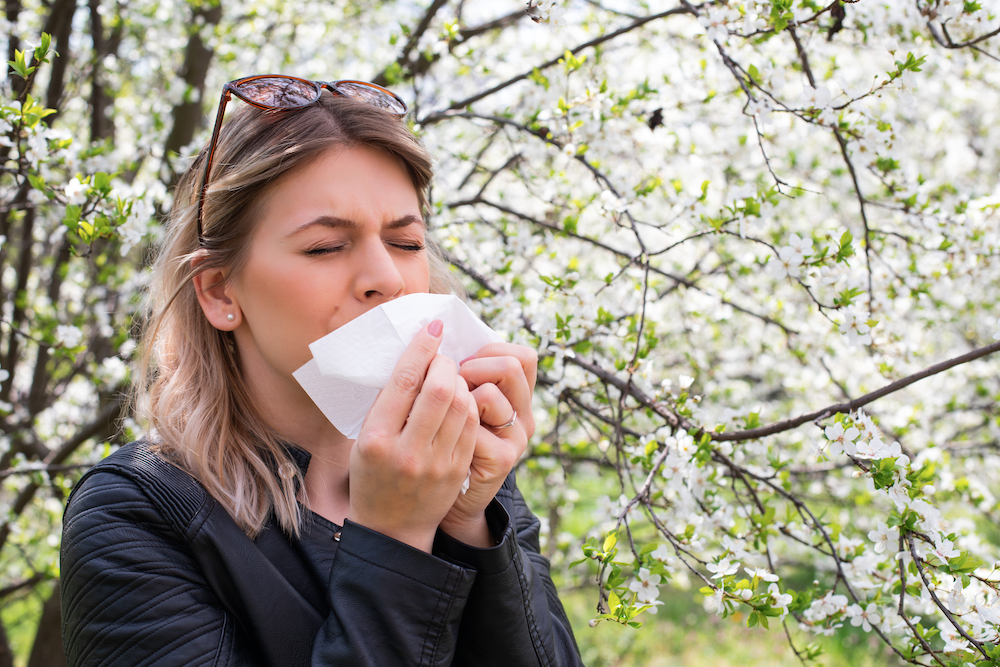
What comes to your mind when you think of Spring and Summer? Is it the sight of blooming flowers? The smell of fresh-cut grass? We know some people are pestered by the symptoms of allergies as soon as warm weather arrives.
VisionFirst is dedicated to answering the tough eye care questions and for this time of year those are ones like, “how to treat itchy, red eyes?” or “can allergies affect my eyesight?” And also, “how do I soothe irritated eyes?” We want to keep our patients informed and knowledgable on how to assess, treat, and manage your allergy symptoms, especially in your face and eyes, so that it does not seriously affect your eyes.

How to Survive Allergy Season
Although it can be difficult to actually get rid of your allergies altogether, there are some steps you can take to manage and lessen your symptoms during the prime time frames. We are going to share our top tips on managing and lessening your pesky allergy symptoms.
- Cut Down Your Time Outdoors
Although we all love to enjoy the sunny weather, it is wise to limit how long you spend time outside to reduce the amount of contact you have with your allergy triggers such as pollen, grass, and pet dander, etc. After you do come indoors, be sure to change clothes or even shower to make sure that you rid yourself of allergens to avoid histamine responses. This is especially important if you’ve just mowed the lawn or worked in the garden.
- Consider Taking Daily Allergy Medicine
Although you should see an allergist to determine how severe your allergies are, many people benefit from a daily over-the-counter allergy medication to fight your symptoms. The most common drug in allergy medicine is an Antihistamine, which blocks your body’s response to your allergy trigger. This medicine will be your defense against the kind of eye irritation that causes puffy, swollen eyes. Be aware that some allergy medications, such as Benadryl, can cause drowsiness. If you have more serious allergies to certain things, you will likely need much more drastic measures to counteract your body’s response to the allergen.
- Clean Your Surroundings
Taking measures to clean your environment can limit your allergy flare ups. Regular dusting of your furniture and vacuuming your floors will reduce the amount of dust, pollen, pet dander, etc. that is present in your home.
Ocular (eye) allergies do cause symptoms such as sneezing, redness, itchiness, burning, wateriness, and puffiness if untreated. When you do experience burning, puffy eyes due to your allergies, your vision can become temporarily blurry. However, with proper measures taken, you can eradicate this and your vision will remain normal.
Allergies Shouldn’t Affect Your Eye Vision or Structure
In summary, allergies should not affect your ability to see or the structure of your eye. However, take care not to rub or scratch your eyes, even if they itch! This is one of the main ways you can harm your eyes in correlation to allergic responses.
If you are experiencing red, itchy, burning, and/or watery eyes as a result of your daily environment, here are the best ways to care for your eyes during these experiences:
- Close your eyes and apply a cold compress over your lids to help soothe.
- Use a trusted brand of saline solution to soothe and lubricate your eyes.
- Wash your eyes out with no-tears baby shampoo. Be sure your hands are cleaned first before applying the water and baby shampoo to your eyes.
If you can’t seem to shake these uncomfortable eye symptoms, along with visiting an ENT, we recommend letting one of our doctors take a look at your eyes to make sure there isn’t another factor affecting your eyes. They can also make sure you haven’t damaged your eye by scratching it.
We hope this blog has given you some helpful tips and insights on how to handle allergies and their effect on your eyes! For any other information or if you have a personal eye care question you would like to ask our team, reach out to us.
If you’re having symptoms in your eyes like we mentioned above, feel free to see one of our doctors. We’d love to help you during this allergy season.
